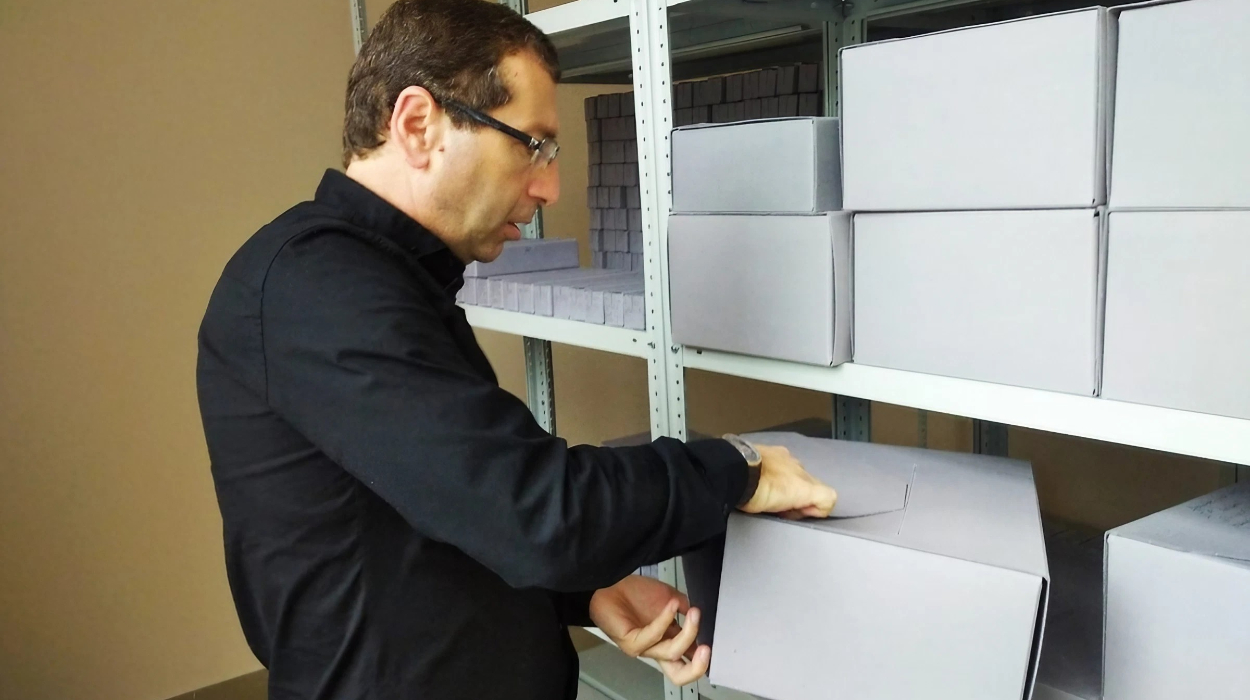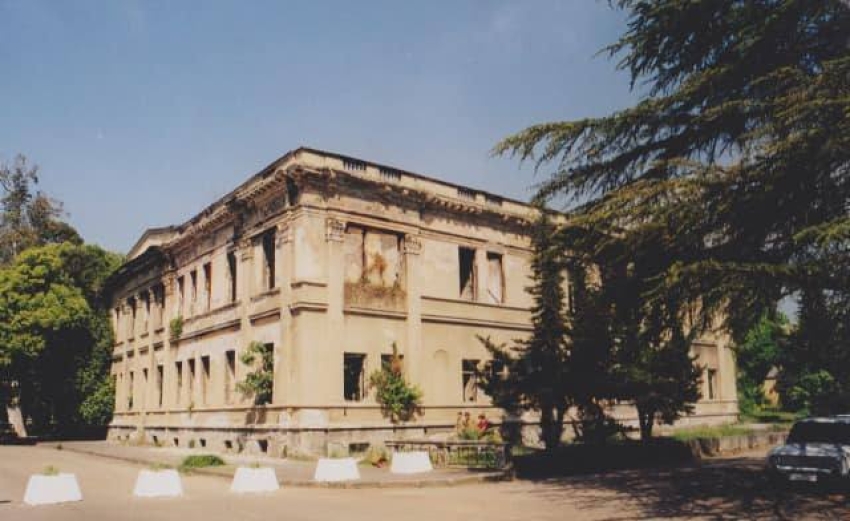Preserving History: An Interview with Dmitry Enik

Dmitry Enik, Deputy Head of the State Archives of The Republic of Abkhazia.
ApsnyPress | In 2014, the State Archive Department of Abkhazia underwent a major renovation under the Investment Programme. Storage rooms were furnished with state-of-the-art equipment, and a fire protection system was put in place.
Dmitry Enik, Deputy Head of the State Archive, spoke to an ApsnyPress correspondent, Alexey Shamba, about the operations of the archive department, its challenges, achievements, and future aspirations. He believes that the primary issue is the chronic underfunding and the problems stemming from it.
Funding Shortage
– Dmitry, what purposes does the equipment serve?
Archival documents, being paper, are a delicate material. Excess humidity can expose them to mould. Prolonged exposure to bright light can degrade inscriptions. Even temperature fluctuations can harm the documents' integrity. Hence, there's a necessity for equipment that regulates both temperature and humidity. Only modern, albeit expensive, equipment can truly meet these needs. Creating the optimal storage conditions for these documents isn't merely a luxury for us, it's a pressing need.
– Given that many budget organisations face funding shortages, what risks does this pose for your department?
At first glance, one might assume we are without issues. The building has been refurbished, and the requisite equipment is in place. It might seem like everything is set for smooth operation. However, the reality is different. The equipment, though installed nine years ago, hasn't been serviced ever since. Thus, there's no telling when it might malfunction, especially at a critical juncture.
– Could you illustrate such a predicament?
Consider our fire protection system. Naturally, water or foam isn't the solution—they would damage the paper. That led to the design of a unique system. When there is a spike in temperature, a pyrotechnic cartridge is activated, setting off a mechanism that releases a special dust. This dust shields the paper from fire. While the documents would subsequently need dusting off, the crux of the matter is, they are preserved. But what if this system fails and the entire archive is engulfed in flames? It's scary to even imagine it. We remember with horror every day how many unique documents were destroyed by Georgian guards during the war.

On the 22nd of October 1992, during the Georgian-Abkhazian War, the Abkhazian Research Institute of History, Language, and Literature named after Dmitry Gulia was deliberately torched by Georgian soldiers.
– Are you suggesting that the equipment requires consistent maintenance and preventive care?
Precisely. Every system has its life expectancy. The company responsible for its maintenance vanished, and hiring other service providers is beyond our budget. It has reached a point where instead of routine maintenance, we are discussing almost a complete system overhaul, a task costing several million roubles. Had things been managed promptly, the expense would be a tenth of this.
– From your interactions with leaders of other budgetary entities, would you say that low salaries are a recurrent issue?
Indeed. Our wages are very low. A regular employee gets around 5,000 to 6,000 rubles (around $60) monthly, which is laughably inadequate. Consequently, it's rare for young professionals to join us. It seems the archive can only attract those with supplemental income sources. This salary concern is frequently discussed, and we were assured of a wage increment come January 2024.
+ 22 October 1992: Burning of the National Archives and Library of Abkhazia by the Georgian invaders
+ A history erased - Abkhazia's archive: fire of war, ashes of history - Video
+ Abkhazia: Cultural Tragedy Revisited, by Thomas de Waal
– How many people are employed by the State Archives?
We have a team of 20, with seven directly handling documents. Abkhazia lacks universities that offer specialised training for archivists—the closest institution is in Moscow. Hence, we collaborate with ASU's Faculty of History. Its dean, Alik Gabelia, occasionally directs students our way for hands-on experience, and a few decide to stay on. However, this doesn't truly rectify our staffing issue. Many come, familiarise themselves with our challenging and dust-laden tasks, and then depart. Consider this: in peak seasons, a hotel receptionist earns in a day what we might earn in a month.
– I am aware that two of your female staff undertook internships in Prague. How did that opportunity arise?
Through agreements from the Geneva discussions, two of our colleagues received training in Prague, acquainting them with contemporary document restoration techniques. Over two weeks, they acquired invaluable knowledge and skills. They returned and diligently served for two years. I hope they rejoin us. Moreover, we received significant archival content from Georgia, albeit indirectly, via the European Union.
Daily routine of the State Archive
– Can you elaborate on the primary responsibilities?
Core tasks revolve around material acquisition and preservation. Various organisational operations across the country generate a vast assortment of documents, ranging from official orders to financial records. All these materials have to be stored for specific durations, someone might require them later, say, to verify their employment duration upon retirement. We organise and safeguard these documents. Some records have set retention periods, post which they're discarded. However, certain archives are retained indefinitely.
– What do these permanent archives include?
They include official documents from ministries and departments, correspondences of historical figures, personal archives, and materials of an individual nature. Typically, these are from prominent citizens who have made significant contributions to our nation's history, leading scientists, writers, poets, journalists, and public figures. Each of them has left behind a vast trove of documents. For instance, we house the personal archives of luminaries like Boris V. Adleyba, Mikhail T. Bgazhba, Mushni K. Khvartskiya, and many others.
– How do you acquire these archives?
The sources vary. Occasionally, family members donate them. Individuals like Batal Kobakhia, Stanislav Lakoba, and Nadezhda Venediktova often provide intriguing materials.
– Is there any academic research conducted within the archive?
Unfortunately, that's a challenge for us. We simply lack the manpower. In days gone by, we used to compile and publish guides to the archive, curating compelling materials into collections. Now, our entire staff is engrossed in document preservation, leaving no room for academic pursuits.
Embracing the Digital Age
– Can you explain the digitisation process?
Initially, documents undergo restoration in a specialised room. They are cleaned, disinfected, and any tears are mended using a specific paper. This paper is both exceptionally thin yet durable, effectively restoring the document while retaining its legibility. A unique, starch-free adhesive is employed, ensuring it doesn't attract pests. Post-restoration and digitisation, researchers can access electronic versions of these records. Meanwhile, the original paper documents are preserved under optimal conditions, shielded from external factors.
– Is digitisation an ongoing activity?
Absolutely. At the start of each year, we determine which collections are to be restored and digitised. The process is time-consuming. For instance, restoring a 200-page metric book alone can span roughly two months. Beyond restoration, we also ensure the completeness of every document. On this note, I would like to extend heartfelt thanks to Ibrahim Chkadua. He graciously volunteers his time, handling digitisation without charging us. His contributions are invaluable.
+ History on fire: how to restore the state-archive of Abkhazia
+ Interview with Boris Cholaria, Director of the National Library of the Republic of Abkhazia
– How extensive is the material that has been digitised thus far?
We have processed approximately 700 gigabytes. To give you an idea, around 180 metric books have been digitised, which represents about a third of their total count. These span from 1879 to 1917 and are invaluable historical resources, illuminating various facets of our past.
– Many ministries and institutions are transitioning their archives to a digital format. Have you collaborated with them on this?
Not as much as we would like. The challenge is that each ministry adopts its own approach to digitisation. Consequently, even if we were to receive such data, we wouldn't be equipped to work with it seamlessly.
– Does this stem from an absence of consistent standards?
No, it isn't a matter of lacking standards. The European Union, Russia, where significant archival digitisation is underway, and even Georgia have established standards. Our roadblock is that complying with these stipulations requires specialised software, which is pricey in itself, not to mention the cost of IT professionals to implement it. We are optimistic about acquiring this technology in the foreseeable future, and hopefully launching a dedicated server, granting access to archival materials. Until then, our primary objective is safeguarding our current archives.
Passion Amidst Challenges
– Dmitry, despite all the difficulties, you give the impression of a man who loves his work.
You are right. We couldn't operate in any other way. Even with our budgetary constraints, we have retained a dedicated team. Our director, Roman Gvindzhia, is instrumental in addressing every challenge that arises. Our storage infrastructure is in impeccable shape, and that's a testament to the diligence of our team, particularly the ladies.
– What aspects of your job bring you the most joy?
When you find something interesting. Perhaps the most exhilarating discovery was an archival collection of photographic films containing replicas of vital documents that Georgian soldiers had burned during the war. For a very long time we didn’t know what to do with these materials, as they were in a terrible condition. After the war we consulted with specialists and were told that without special equipment and reagents it was better not to touch the films. As a result, the materials waited 20 years for restoration. Later, we were helped with equipment, our staff was trained, and we managed to restore a huge number of important documents that we had long considered lost.
It is also, of course, very interesting to learn about your ancestors. With metric books, one can chart their ancestry back nearly 150 years.
– How do you maintain your optimism amidst these challenges?
When you see a document signed by Nestor Lakoba, you realise that your profession is very important. There is little point in lamenting our challenges; instead, we must press on and give our best. We understand that the nation grapples with a myriad of pressing issues, whether it's defence, pensions, or vital infrastructure projects. Given these concerns, one might feel our archival matters can be momentarily set aside. While we, as a team, can exercise patience, the fragile nature of our documents means they can't afford to wait indefinitely.
This interview was published by ApsnyPress and is translated from Russian.